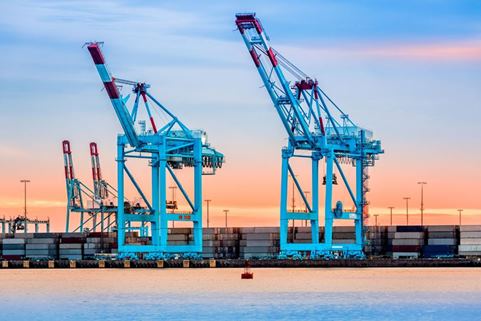Tentative agreement reached between ILA and USMX
A tentative wage agreement has been reached, and the Master Contract has been extended until January 15, 2025, with all job actions ceasing immediately.

As of October 3, 2024 the United States Maritime Alliance (USMX) and the International Longshoremen’s Association (ILA) have released a joint statement:
” We have reached a tentative agreement on wages and have agreed to extend the Master Contract until January 15, 2025, to return to the bargaining table to negotiate all other outstanding issues. Effective immediately, all current job actions will cease, and all work covered by the Master Contract will resume.” (source: USMX)
The brief stoppage offers relief to concerned clients as well as logistics providers yet falls short of the initial demand. The agreed deal includes a substantial wage increase of approximately 62% for the workers, according to a source familiar with the negotiations. (source: GCaptain).
Delayed port openings
Despite the recent agreement between the International Longshoremen's Association (ILA) and the United States Maritime Alliance (USMX), not all ports are reopening immediately.
Some key ports are still affected by ongoing closures or gradual reopening plans. For example, ports like Savannah and Brunswick in Georgia, along with the Port of New York and New Jersey, have faced significant disruptions. While Savannah and Brunswick have started to resume operations on October 4, others remain in various stages of reopening or remain closed depending on their local negotiations and logistics. According to the Port of Houston, they are scheduled to re-open Houston’s Bayport and Barbours Cut on Friday, October 4, 2024 at 1:00 p.m.
The Port of New York and New Jersey said on social media that facilities would remain closed on Friday despite the USMX agreement, with more details to follow, according to CBS News.
DSV continues to urge clients to consider current inventory which is already in transit. Evaluate your key components for possible urgent replacement and consider airfreight for new originating orders. It is also prudent to consider spreading new orders across varying modes of transport at various entry points for risk mitigation. If your cargo has arrived a U.S. port, it is with all intention according to the joint statement that work will resume immediately.
Container imbalance
The strike could cause a global bottleneck and shortage of containers. Normally, these containers return from the U.S. to Asia or Europe; however, with the delay these containers which are set to return to reload are at anchor. Further complications include thousands of containers diverted to ports unintended as their last port of call. Most affected is the Port of Savannah, having received over 1,400 unintended containers. The ripple effect is expected to cause downline delays and choke points for the trucking industry as well.
Although the announcement is welcome news to the industry, ‘business as usual’ will still remain to be seen, as the weeks ahead will continue to carry complications to clear the ports as carriers are expected to continue to unload at unintended ports in order to return into rotation as soon as possible.
How DSV can assist
At DSV, we are actively collaborating with our clients to mitigate our client exposure to risk. We offer significant uplift options, including airfreight or sea/air combination routes, to ensure your cargo reaches its destination with minimal disruption. For tailored contingency plans that address your unique needs, contact your local DSV representative to discuss the best alternatives.Haben Sie Fragen? Avez-vous des questions? Avete domande?
Our experts are ready to help. Get in touch and we'll find the solution you need.

